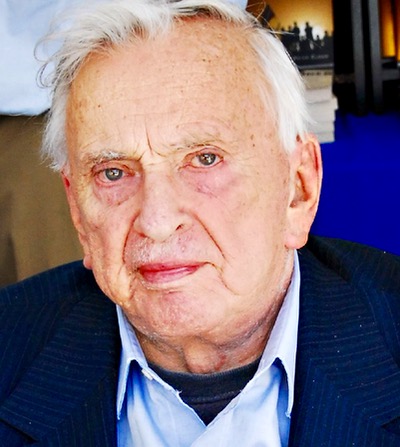
November 17, 1999.
Since the Gulf of Tonkin incident, when I was a fourteen-year-old reading Julian in a rowboat out in a northern Minnesota lake, I have admired Gore Vidal’s style and paganism.
I voted for him in 1982, in the Democratic Party primary for the U.S. Senate seat that Pete Wilson defeated Jerry Brown to win, and didn’t really expect ever to see him in person. But I went to church (the Metropolitan Community Church in the Castro) with him today (17 November 1999).
His Cleis Press publisher asked him when was the last time he had been in church. He said it was the funeral of Pope John XXIII in St. Peter’s with a Polish prelate and the rest of the most fanatically right-wing of the hierarchy there to make sure he was dead.
Someone else asked what would have happened if Julian had triumphed. “Most everything,” was his answer. Not monotheism, especially not the mystifying one god in three parts. He did quote something (I forget what) from Ecclesiastes.
He expressed nostalgia for the Lavender Panthers, though saying he was not, of course, “advocating violence, and I don’t want you to go forth from this church and—well, just be prepared!” He hasn’t been in San Francisco since his senatorial campaign. He denied that he lived in Italy, saying he has a house in Italy and a house in the Hollywood Hills, “so you could argue I don’t live in America at all.”
He mentioned that he had been interviewed by Alfred Kinsey and thought that the data Kinsey elicited was more valid than that middle-class women interviewers elicited, especially about the incidence of same-sex sex.
Vidal claims that his 1948 novel The City and the Pillar was the first shock to the general reading public of representing non-pathological male-male love (homicide isn’t pathological? That he revised later.) Kinsey supplied his later in the year.
A really idiotic question (the first one from the audience) was whether he found his pessimism about America in the 1980s has lessened. He spoke of the increased disparity of wealth and the ongoing panics to justify the war machine. He was particularly harsh on Harry Truman (and his apotheosis as “a cute little honest guy, practically a saint, though he was about as sinister as they come”). I thought that Vidal blamed Abraham Lincoln for much of the undemocratic American imperial state, And Theodore Roosevelt. (I don’t remember him faulting Jefferson for the Louisiana Purchase or writing about the Mexican-American War, but generally he has represented the rot of imperialism beginning much earlier than Truman’s presidency, in particular with Lincoln de facto suspending of the Bill of Rights.)
Vidal thinks that what the man who defeated him in the senatorial primary (Jerry Brown) is doing in the way of community-building in Oakland is interesting but that there is little hope (and therefore little participation) in electoral politics since there is no longer representative government. I don’t know why someone asked him about George Stephanapolous, but he took the question as an occasion to talk about class and quote Mary Matlin about Stephanapolous being deluded that someone like them with working-class background could make it beyond spin-doctoring to actually participating in running the country.
To a question about the future, he replied that he had no experience of it. The question should be directed to Shirley Maclaine instead. (Though he has set several books in futures.) The disenfranchisement of black males he sees as particularly nefarious—a design to prevent democratic change
He ended by quoting another Republican, a vice president not related to him, Spiro Agnew, that the U.S. is “the greatest nation in the country.”
Regarding what he knows about Eleanor Roosevelt and Lorena Hickok: he first said that being curious about Eleanor’s sex life felt like being curious about one’s grandmother’s (not something one is eager to do) but did hope that she had some happiness in her private life. He then acknowledged that a cousin (of FDR’s, I think) recurrently called attention to her “sapphic” nature to anyone and everyone who would listen. So he in some sense knew about it, but didn’t think about it. Reading the recently published letters made clear to him that there had been a physical relationship. He also recalled meeting Lorena a few times. She continued to live in Hyde Park (in the district in which he ran for Congress in 1960?), was a dreadful alcoholic, whom Eleanor stopped seeing.
Regarding Trent Lott (whom he thinks bears some responsibility for Matthew Shephard’s murder), Vidal sniffed that the two things Lott likened to homosexuality, alcoholism and kleptomania, are very prevalent in the Senate.
The 74-year-old Vidal moved stiffly and cautiously but definitely had his wits, quips, and stories about him. He continued to take questions after his handler took the last one and continued to sign books until his handler cut off the line more than an hour later. No lack of stamina!
©1999, 2016, Stephen O. Murray

